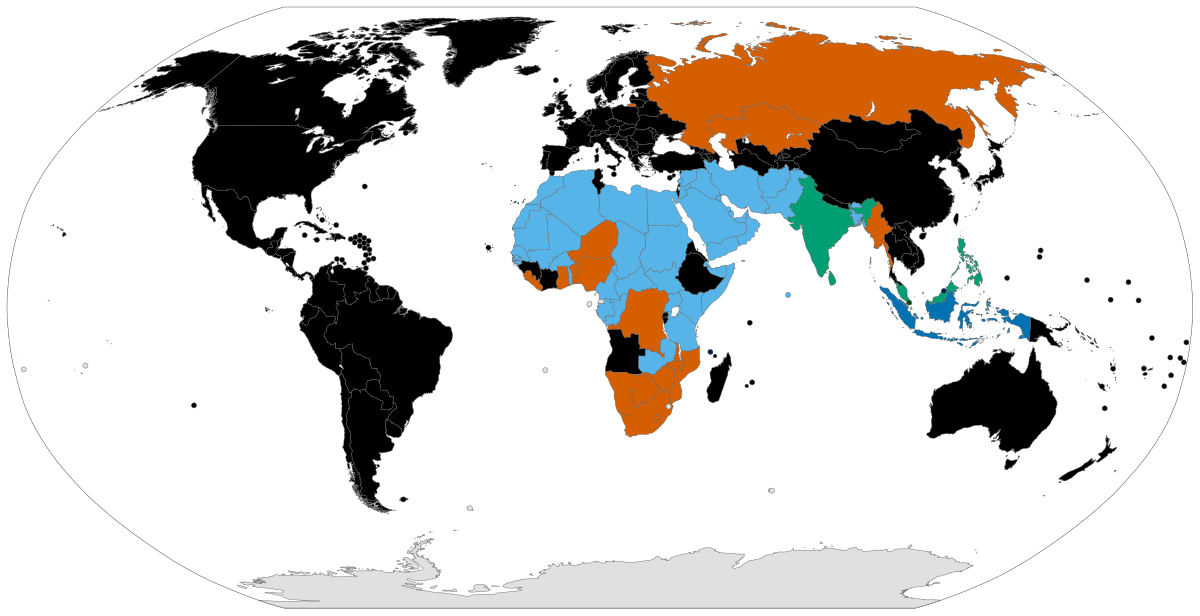lifefuel
Anti-White Propagandist
★★★★★
- Joined
- Nov 12, 2017
- Posts
- 9,607
The Mosuo tribe of China is one of the world’s last surviving matriarchal societies. Here women make the business and household decisions, not men.
Property and family lineage are inherited by the female. Women are highly respected and hold significant decision-making power. Men take care of the children and herd livestock.
It sounds like a feminist paradise, but is it as cool as it sounds?
In the Mosuo culture, there is no divorce because the concept of marriage doesn’t exist. Instead, men and women have the freedom to engage in romantic relationships with whomever they choose, and they may change partners throughout their lives.
But the couple does not live together but maintains their own households. The man, instead, ‘walks’ to the woman’s home at night — like a romantic rendezvous — and leaves in the morning to return to his own home.
If the woman becomes pregnant, the child is raised by the mother and her family. Children are considered to belong to the mother’s family and not the father’s. There’s no stigma attached to it, either, and no expectations of support from the child’s father.
It’s not surprising. In a male-dominated society, women are dependent on men for their livelihood, although this doesn’t mean women laze around.
They’re responsible for the household and child-rearing, and every significant family event is run and organized by women. So the patriarchy benefits men but not women.
Because it's not "patriarchy" you fucking dipshit. Patriarchy never existed. Every society is skewed to the benefit and protection of women. It's just a matter of how they go about it.“You are responsible for almost nothing, you work much less and you spend the whole day with your friends. You’re with a different woman every night. And on top of that, you can always live at your mother’s house. The woman serves the man and it happens in a society where she leads the way and has control of the money. In a patriarchy, we men work more — and every now and then we do the dishes.”
So it’s safe to say that a matriarch society benefits both men and women, but a patriarchal society only benefits men.

"Only", as in women derive zero benefit. Do these people even hear themselves when they talk?
Bonus: Some post-wall lawyer went to go live with them and apparently has a home there now.
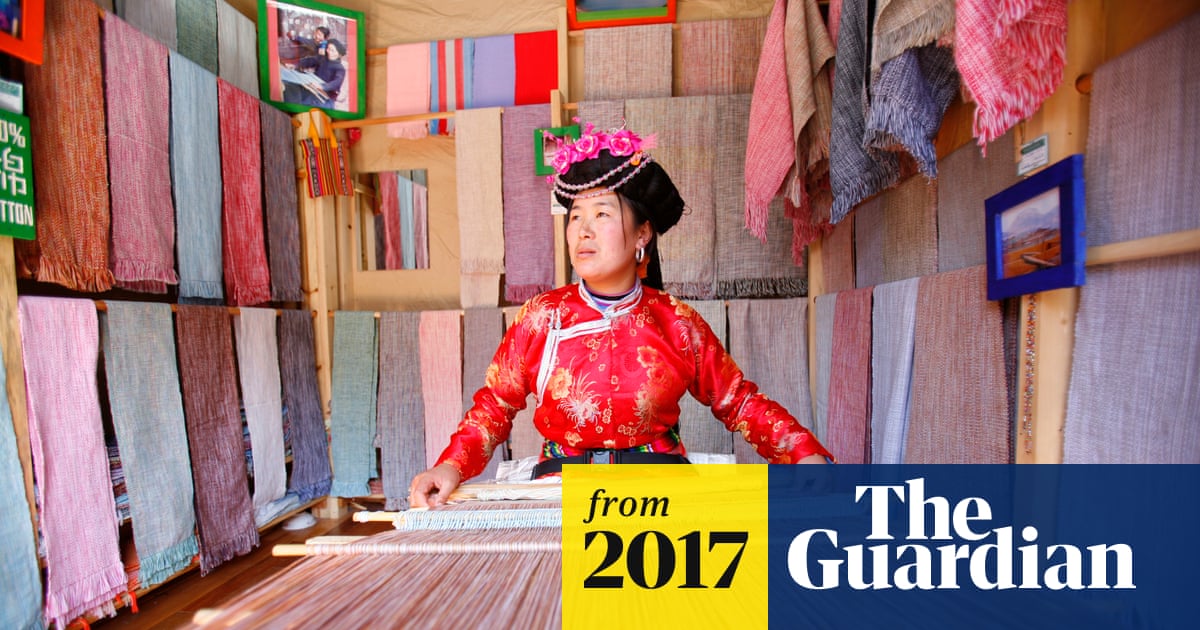
The kingdom of women: the society where a man is never the boss
It’s a place where women rule, marriage doesn’t exist and everything follows the maternal bloodline. But is it as good for women as it sounds – and how long can it last?
"To western eyes, this is the less progressive side of the Mosuo way of life. Is a society that, in many ways, emancipates women from marriage, and gives them sexual freedom, actually producing glorified 1950s housewives who have no choices other than motherhood? It’s a frustration that Waihong feels with her goddaughter Ladzu, now 22. “She is a mother, and leads a very domestic life,” says Waihong. “For a young Mosuo woman, that’s not unusual. But I wish it were different. For me, it’s a waste.”"
LOL they will literally never be satisfied. So not even "matriarchal" society isn't acceptable either huh?
This impoverished, isolated, 40k deep tribe in bumblefuck China is used as a meme for why female-run societies are better. But how many foids are really trying to live this life? There are many tradeoffs to living this way. That's what these idiots don't get. You can't have it all. They always expect to have their cake and eat it. Which is why the lawyer mentioned above doesn't live there full-time.
Full article via medium.com:
A Society Ruled by Women — But Is It As Cool As It Sounds?
Marriage doesn’t exist, the mother and her family bring up any offspring, and the grandmother is the head of the family.
Imagine a land where women rule and men don’t have any formal authority over women or hold significant power.
Sounds heavenly?
The Mosuo tribe of China is one of the world’s last surviving matriarchal societies. Here women make the business and household decisions, not men.
Both men and women live with their biological families for the rest of their lives. That includes the ‘husband’, written in quotes, because marriage doesn’t exist in this community.
He doesn’t raise his own children. He lives with his biological family, taking care of his nieces and nephews and becoming their father figure.
Everyone is responsible for taking care of the children. There’s no word for ‘aunt’ and your mother’s sisters are also your mothers.
Property and family lineage are inherited by the female. Women are highly respected and hold significant decision-making power. Men take care of the children and herd livestock.
It sounds like a feminist paradise, but is it as cool as it sounds?
The matriarchal Mosuo culture
The Mosuo tribe, also known as the ‘Na people,’ is a small ethnic group of about 40,000 people who live in the southwestern part of China near the Lake Lugu in the Tibetan Himalayas.
Here, the grandmother is the head of the household and the primary decision-maker. Without her blessing, nothing happens.
Sounds cool, right?
In the Western world, where beauty is paramount to influence, once you get old, you’re not considered of much use, especially if you’re a woman, leading to isolation and loneliness, increasing your risk of premature death.
And as a mother of a 4-year-old living in Western culture, the thought of a village raising my child sounds good, too. In my culture, you rely on yourself or your partner to take care of your child, and, if lucky, your grandparents.
It’s not surprising then that ‘gray divorce’ has doubled in the U.S. In 2015, 10 in every 1,000 married people 50 and older divorced. In 1990, this number was five.
In the Mosuo culture, there is no divorce because the concept of marriage doesn’t exist. Instead, men and women have the freedom to engage in romantic relationships with whomever they choose, and they may change partners throughout their lives.
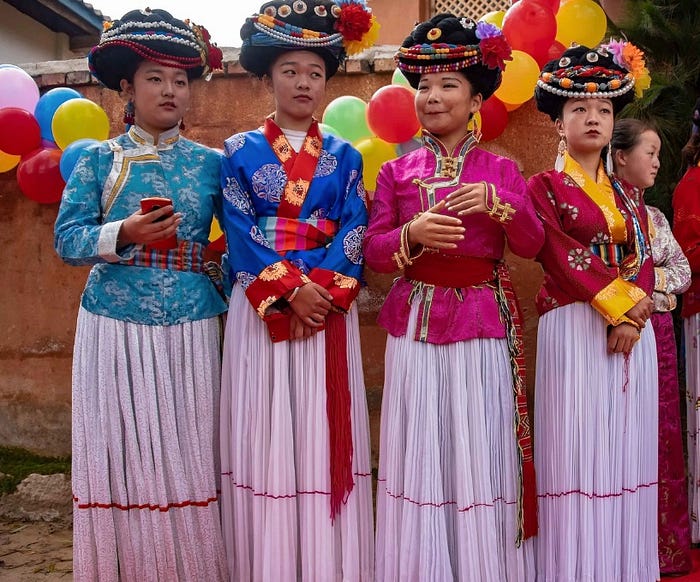
Photo by Rod Waddington via Flickr: Mosuo girls greeting guests.
It’s a unique form of marriage known as the ‘walking marriage’, or ‘tisese’ in the Mosuo language. The couple enters into a relationship based on mutual agreement and respect.
In this tradition, the Mosuo people do not have a formal wedding ceremony. However, they have a ceremony to mark the beginning of a new romantic relationship called “zouhun,” which means “going to the soul.”
But the couple does not live together but maintains their own households. The man, instead, ‘walks’ to the woman’s home at night — like a romantic rendezvous — and leaves in the morning to return to his own home.
If the woman becomes pregnant, the child is raised by the mother and her family. Children are considered to belong to the mother’s family and not the father’s. There’s no stigma attached to it, either, and no expectations of support from the child’s father.
Kinda refreshing if you ask me. In both Japan, where I grew up, and Nepal, my heritage, the society is patriarchal and some of the laws still grossly favor men.
For example, in Nepal, it’s harder for children of Nepali women to obtain citizenship than it’s s for children of Nepali men. The same goes for foreign husbands of Nepali women. But a foreign wife of a Nepali man can easily obtain citizenship.
It’s not surprising. In a male-dominated society, women are dependent on men for their livelihood, although this doesn’t mean women laze around.
They’re responsible for the household and child-rearing, and every significant family event is run and organized by women. So the patriarchy benefits men but not women.
Yet, the matriarchy benefits men, says Argentinian writer Richard Coler in an interview with Spiegel, a German publication. He spent two months with the Mosuo society and concluded that “men live better where women are in charge.”
He expected to find an “inverse patriarchy,” but he found that “women have a different way of dominating.”
The values of Mosuo women are centered on caring for the community’s needs. It’s not about one sex dominating the other, like in a patriarchal society, he observed. Therefore, “there is no violence in a matriarchal society,” and for the Mosuo “women are simply the more effective and reliable gender.”“You are responsible for almost nothing, you work much less and you spend the whole day with your friends. You’re with a different woman every night. And on top of that, you can always live at your mother’s house. The woman serves the man and it happens in a society where she leads the way and has control of the money. In a patriarchy, we men work more — and every now and then we do the dishes.”
That doesn’t mean men are cast aside. Men make “really big’ decisions like “buying a house or machine or selling a cow”. In other words, the Mosuo culture understands that men have different skills than women and utilize their innate nature.
So it’s safe to say that a matriarch society benefits both men and women, but a patriarchal society only benefits men.
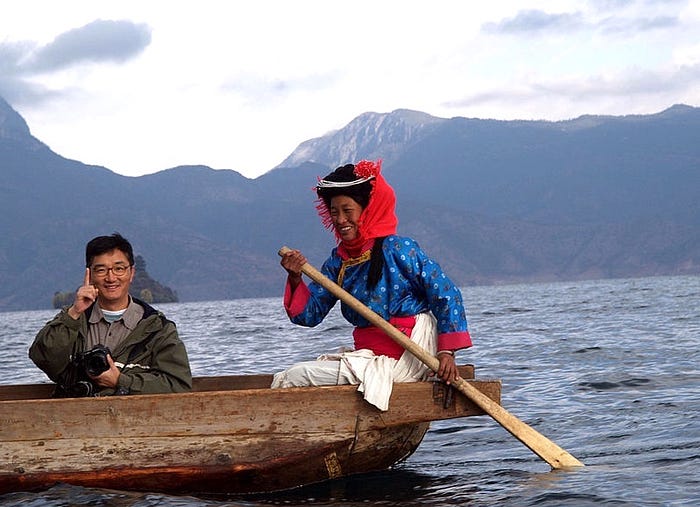
Photo by Seihon Cho via Wikimedia Commons: A Mosuo woman paddling at Lake Lugu with tourist on board.
Maybe it’s not about equality
It’s in the nature for men to compete and conquer. Most battles are fought by men, after all. Maybe it’s not equality that’s important, but that we respect and honor our innate nature.
The Mosuo culture does that and maybe that’s why it works. Although the younger generation, influenced by tourism and modernization, has gone on to marry Han Chinese men and live in conventional homes. I guess the grass is always greener on the other side.
The International Academy HAGIA, which explores the long history of matriarchal societies and cultures, say that matriarchies are mother-centered societies based on maternal values like care-taking, nurturing, and motherliness.
And this is more conducive to the “human condition human condition than the way patriarchies conceptualize motherhood and use it to make women, and especially mothers, into slaves.”
There have disadvantages too. Because women are expected to fulfill certain gender roles and expectations, this can limit women’s opportunities for education, employment, and personal fulfillment.
Like, for instance, if a woman decides to pursue different paths or challenge traditional norms. They may easily do so because the average income is low (US$150–200 per year).
Still, in a matriarchal society, women hold the primary positions of power and authority, and they are the ones who make decisions and shape the direction of society.
When women’s voices are heard, there is greater gender equality. Since women have access to the same opportunities and resources as men, improved social status, and greater freedom, they have the means to reject or accept romantic advances.
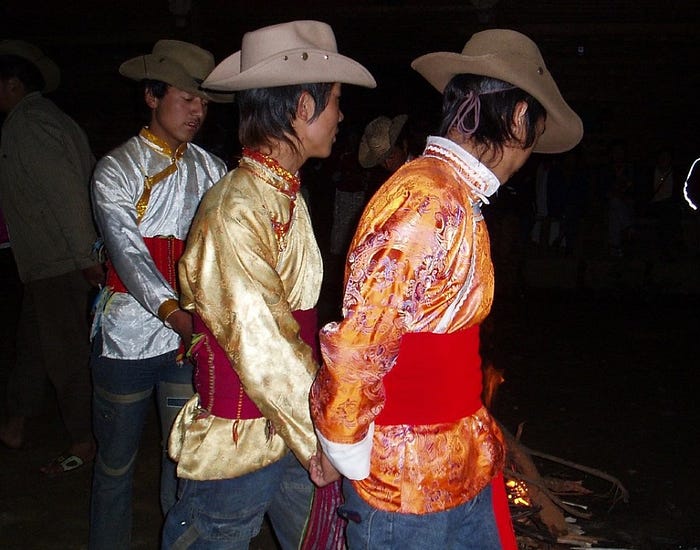
Photo by Sherry Zhang via Flickr: Mosuo boys
In conclusion
Even though the Mosuo culture is slowly eroding, I’m convinced that a matriarchal society is more beneficial for both genders, primarily because they’re more about what’s good for the group rather than individual promotion.
What’s impressive is that this ancient tribe managed to keep its traditions intact for this long. The Mosuo women seem to have a quiet strength about them, like the Himalayan mountains they call home.
They’re also physically strong from all the laborious work to feed their families. It reminds me of my Nepali mom and aunts, who I’ve seen labor in kitchens during religious events — which there are many in Nepal — while the men drink and chat (and do nothing).
As a Westerner, this always felt unequal and I’ve told my mom exactly so, to which she responded, “When duty is put before you, you do it.”
I get what she meant, but I’m sure my mom and most women, in general, would’ve preferred to labor in a matriarchal society since the reward is eternal respect and homage in old age.
Now that’s something I wouldn’t mind working for.
